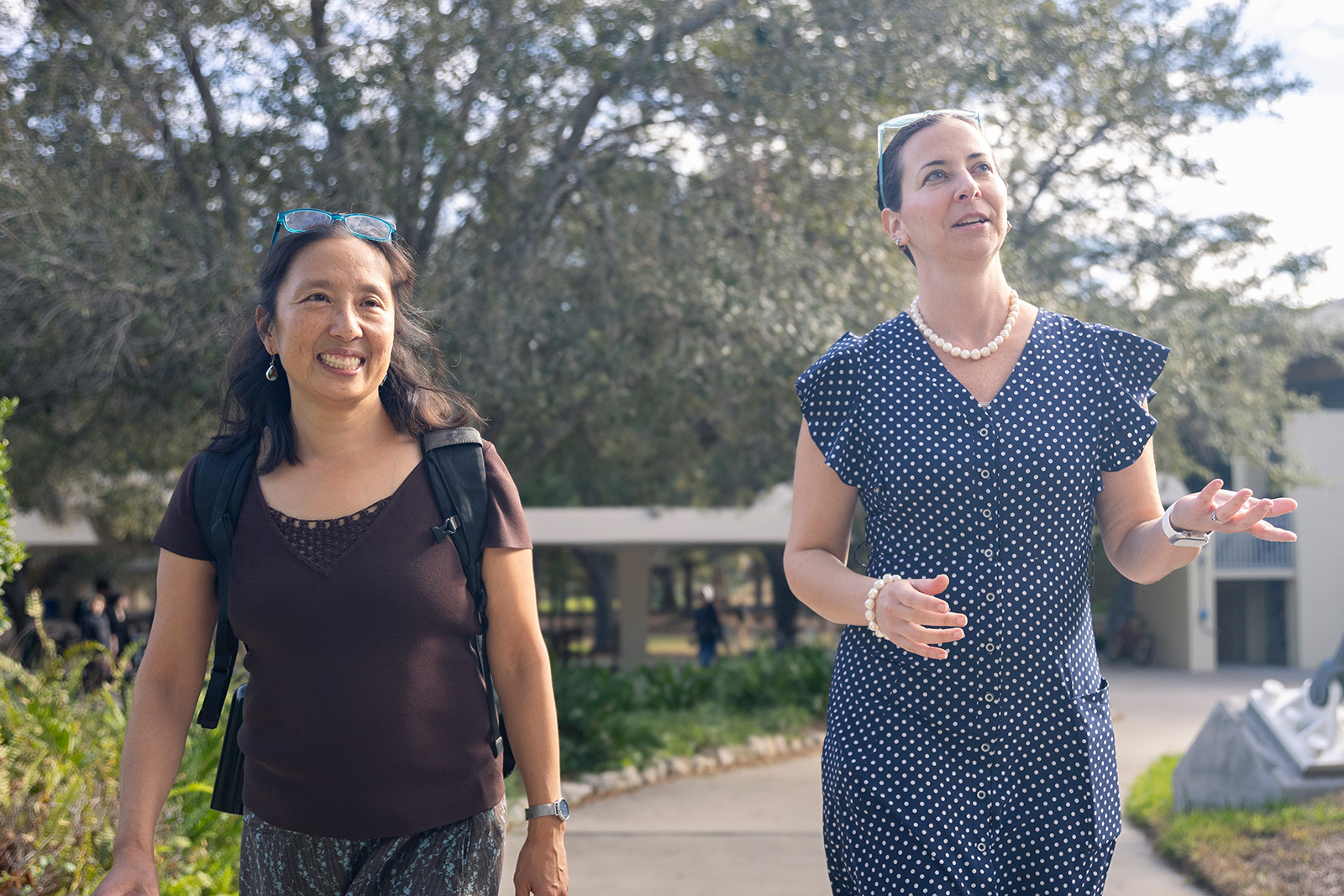“Let’s talk about the weather,” said Emily T. Yeh, Ph.D., the Phi Beta Kappa visiting scholar speaking at Eckerd College’s Dan and Mary Miller Auditorium on Nov. 9. But this conversation went far beyond small talk.
Cloud seeding is a common way humans have attempted to modify weather patterns, she explained. This method involves introducing a compound called silver iodide into the atmosphere via burning flares, rockets or aircraft. Water vapor attaches to the silver iodide, forming ice crystals or water droplets that become heavy enough to make it rain or snow. This method has been used in the western United States since the 1950s but lost traction in the 1980s because it is difficult to find sufficient proof that it works. Cloud seeding can occur only when clouds are already present, which makes it difficult to perform and replicate controlled experiments.
With recent manifestations of climate disasters, cloud seeding has been more seriously considered as a method to adapt to climate change. Nine U.S. states have cloud seeding programs—all monitored by the National Oceanic and Atmospheric Administration. California has the most active program, which is being used to combat droughts caused by climate change, Yeh shared with the audience.
Much of her research focuses on the hydrosocial cycle, which is a process involving the ways society and water interact with each other. It considers the capital, power and politics of water circulation.
Andrew Lau, a first-year marine science student from New York, was fascinated by the concept of water as a commodity instead of a shared resource. “It’s a basic human need, so I’ve never thought about it from an economic standpoint,” he said.
Many of the cases Yeh presented in her lecture showcased the conflicts that arise between science and humanity. Even the term “cloud seeding” has connotations that suggest the water clouds naturally produce can be harvested and used for profit. People who oppose cloud seeding have two main concerns. The first is that silver iodide, since it’s insoluble, will result in increased levels of silver in the environment, which has the potential to be harmful. Yeh cited studies, however, that do not show elevated levels of silver in areas where cloud seeding is common. The other concern is a community’s right to natural precipitation. People worry that making rain before the cloud is “ready” steals that natural waterfall from the area it would have fallen on without human interference. Yeh argues that climate change in itself is a form of weather modification, and evidence suggests that cloud seeding creates the possibility of more precipitation downwind. Natural weather is important to people, and there are concerns when attempts are made to modify it.
In the United States, she noted, cloud seeding operations have introduced new public-private partnerships in a geopolitical context. Debates and lawsuits have begun to determine landowners’ rights to the moisture in the atmosphere over their land. Only three state court cases have settled on this matter, each deciding different parameters of ownership.
Internationally, there is no agreement on an altitude of “volumetric sovereignty,” meaning how high into the air a governing body has jurisdiction. Back in February, Yeh said, a Chinese balloon was shot down off the coast of South Carolina, which caused international debate about the legality of invading airspace. China argued that the balloon was studying the weather, using the weather in an attempt to defuse tensions, as if it were a shared resource. India and the United Arab Emirates also have accused China of weaponizing the weather.
Yeh shared several other geopolitical tensions involving cloud seeding. According to the International Trade Administration, the UAE has one of the highest water consumption rates per capita in the world. Cloud seeding provides the opportunity for an “imaginary infinity of water,” but again this could be problematic because cloud seeding works only where clouds already exist, and the UAE is known for being an arid desert. As a solution, the UAE is considering terraforming to facilitate cloud formation in their atmosphere. This means they’re building a giant artificial mountain that will force air to rise naturally, creating more clouds to seed.
Maggie Crofford is a first-year marine science student from Cape Cod, Massachusetts. As a student currently studying geology, she is interested in how this new mountain formation could affect the surrounding landscape.
“I never would have thought of that, and I’m curious to see how effective it will be,” she said. “It’s cool to see the concepts we learn about in class in action.”
In China, weather modification bureaus exist in every province, and many municipalities are active in the regulation and commission of cloud seeding. These governments use cloud seeding to promote agriculture, secure water sources, control weather conditions for important events (such as the Beijing Olympics) and establish ecological civilization. The goal of ecological civilization is to use technological solutions to solve ecological crises. Human systems should promote the well-being of the Earth.
“We can see why cloud seeding is so entrenched in China,” Yeh said.
The governments have to chase funding to keep their operations going, and cloud seeding research makes big promises to secure funds. It also has created more than 50,000 jobs, therefore promoting the economy.
Cloud seeding sounds promising in its ability to be transformative for the climate crisis. But it comes with unexpected consequences. What happens to desert areas when more rainfall is introduced? The UAE has reported instances of localized flooding when the natural environment can’t handle the human-made changes to the climate.
Weather modification is hard to govern, Yeh pointed out. It brings new possibilities for conflict. But through international scientific collaboration, it is helping to alleviate climate disasters and protect those who are particularly vulnerable.
“I was surprised by how long [cloud seeding] has been around,” Andrew said. “I’m sure companies will be quick to capitalize on it as we learn more about it, but I think it could be helpful in the future.”













